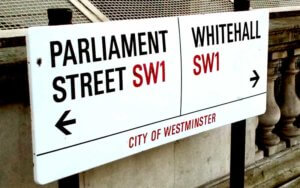
Esther McVey, the Conservative employment minister, caused alarm and confusion in November after she told her Labour shadow that it was not government policy to warn health or social services when vulnerable service-users were sanctioned.
Under current sanctioning rules, claimants lose at least a week’s benefit for missing a single appointment or session of work-related activity.
McVey told Stephen Timms in November in a written answer: “There is no formal policy to liaise with Health and Social Service agencies when a sanction is applied.”
Disabled activists told Disability News Service (DNS) at the time that her response was “appallingly callous”, and “makes a mockery of the government’s claim that sanctions policy is intended to move people into work for their own wellbeing”, while one campaigner said the failure “amounts to passive euthanasia”.
Earlier in November, DNS had revealed that the Department for Work and Pensions (DWP) had carried out 60 secret reviews into benefit-related deaths since February 2012.
Coalition ministers have consistently denied any connection between their welfare reforms and cuts and the deaths of benefit claimants.
But there have been numerous reports of disabled people whose deaths have been linked to the employment and support allowance (ESA) claim process, the refusal or removal of ESA and other benefits, and the DWP’s use of sanctions to temporarily remove benefits from a claimant. Many of these cases involved people with learning difficulties or mental health conditions.
DNS has now learned that there are procedures that DWP civil servants are supposed to follow when a “vulnerable” person is about to have their benefits sanctioned, particularly if they have learning difficulties, mental health conditions, or “health conditions which affect cognition”.
These “core visit” procedures state that benefit recipients who are seen as “vulnerable” and have failed to attend a work-focused interview or carry out work-related activity without “good cause” must receive a “core visit” from a DWP visiting officer before any sanction is imposed.
If they are unable to make contact with the claimant, DWP must “attempt to contact” the claimant’s representative or next of kin, their psychiatric nurse, social services or the police in order to “establish the claimant’s welfare”.
Only after these steps have been taken should a sanction should be considered.
But in a submission to the Commons work and pensions committee’s newly-launched inquiry into benefit sanctions, Disability Rights UK says there are “serious failings in the scope and application of the safeguards”, which were introduced in 2000 following the death of a man with schizophrenia.
The coroner in that case concluded that “neglect by the Benefits Agency had contributed to the death and suggested that the Benefits Agency should have special rules for those suffering from mental illness”.
But DR UK highlights in its evidence to the inquiry that there are “a number of problems” with the safeguards that were introduced in 2000.
The rules only apply to claimants of ESA, the out-of-work disability benefit, and not to disabled people claiming the mainstream jobseeker’s allowance, many of whom will have learning difficulties or mental health conditions.
DR UK also warns the committee that records on claimants’ vulnerability do not appear to be accessible to all relevant DWP staff, and “are not enshrined in legislation”.
A DWP spokesman said the Timms question had been “interpreted” by McVey to mean measures taken after a sanction was imposed, rather than before, which is why the minister said in November that there was no formal policy in place to warm health or social services when a vulnerable person was sanctioned.
He said in a statement: “The policy is being properly applied, and relates to how we support vulnerable people before any sanction is applied.
“We make every attempt to support vulnerable claimants who aren’t fulfilling their commitments to taxpayers to do the right thing so they don’t face a sanction.
“This can include home visits, especially for people with mental health conditions or learning disabilities.
“When we have tried twice without success to visit someone in their home, we would then contact either a family member, Community Psychiatric Nurse, Social Services or the police.”
A spokesman for Timms said that a “common sense” reading of his question was that it referred to measures taken before a sanction was imposed, and not afterwards.
16 January 2015

 Government is misrepresenting workplace disability inequality, MPs are told
Government is misrepresenting workplace disability inequality, MPs are told It was emergency planning that was vulnerable during Covid, not disabled people, inquiry is told
It was emergency planning that was vulnerable during Covid, not disabled people, inquiry is told